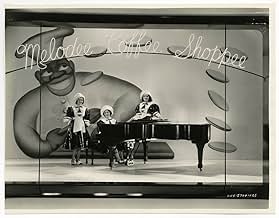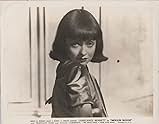Agrega una trama en tu idiomaA singer marries a famous composer, and after a while she gets the itch to go back on the stage. However, her husband won't let her. When she hears that a popular French singer named "Raquel... Leer todoA singer marries a famous composer, and after a while she gets the itch to go back on the stage. However, her husband won't let her. When she hears that a popular French singer named "Raquel" is coming to New York, she decides to go to Raquel with a plan--unbeknownst to her husba... Leer todoA singer marries a famous composer, and after a while she gets the itch to go back on the stage. However, her husband won't let her. When she hears that a popular French singer named "Raquel" is coming to New York, she decides to go to Raquel with a plan--unbeknownst to her husband, "Raquel" is actually her sister, and her plan is for them to switch places so she can ... Leer todo
- Dirección
- Guionistas
- Elenco
- Premios
- 3 premios ganados en total
- Sculptor
- (escenas eliminadas)
- Show Girl
- (sin créditos)
- Show Girl
- (sin créditos)
Opiniones destacadas
It gives Constance Bennett a chance to imitate Fifi d'Orsay and play a dual role as twin sisters. Once upon a time Connie and Connie were a sister act. But one Connie went to France and became a big musical French star like a Caucasian Josephine Baker and the other Connie stayed in America and married Franchot Tone. But no one knows American Connie has a twin sister with a decided French accent like Fifi d'Orsay.
French Connie's been imported by producer Tullio Carminati to star in his Broadway revue. American Connie wants to get back into show business, but husband Tone isn't having that at all.
Anyway French Connie wants a break, so the sisters agree to switch. Of course this causes complications as Franchot is much taken with who he thinks is a French star that bears a fascinating resemblance to his wife and Carminati is on the make himself for her.
I think most of you can see where this is going. Like the Busby Berkeley films which Moulin Rouge tries so hard to imitate, the plot is just a flimsy device for the final numbers in the show.
The film has two things going for it that make it slightly better than some ersatz Berkeley. The first is the song writing team of Harry Warren and Al Dubin, imported from Warner Brothers and some Berkeley films they were writing. The second is choreographer Robert Muskert who has only two film credits, Moulin Rouge and the Paul Whiteman revue, The King of Jazz. But he's more importantly known as the founder and first choreographer of the New York City Radio Hall Rockettes. Look in that chorus line and you might spot a young Lucille Ball.
Bennett gets to sing two great Harry Warren songs. The first is a duet with Russ Columbo later re-prised by the Boswell Sisters, Coffee in the Morning. And the second is that famous torch ballad Boulevard of Broken Dreams. Two decades later Boulevard of Broken Dreams was revived and became a big mega-hit for a young and up and coming singer named Tony Bennett.
I have to say Constance Bennett did quite well with both numbers. She also turned in a fine performance. And Franchot Tone got to wear tails again.
And you thought he'd get a break from that just cause he was on a loan out from MGM.
The story concerns an ex-performer, Helen (Bennett) who desires to go back on the stage. However, her husband, involved in the production of a new musical, objects.
When Helen learns that the famous French singer Raquel has been cast, she has a fit. Due to their resemblance to one another, she and Raquel had done a "sister act" in the past.
When the two meet, Raquel says that she needs a break - she knows all the songs anyway, so she will return on opening night. Meanwhile, Helen can handle the rehearsals. All she has to do is dye her hair blonde, which she does.
The situation becomes complicated when it appears that both the producer (Carminati) and Tone are both after her. This upsets Helen, and she decides she has to know whether or not her husband will leave her for Raquel.
This gives Bennett a great opportunity to imitate a French chanteuse and sing a couple of great songs, wriitten by Harry Warren and Al Dubin, Coffee in the Morning and Kisses at Night, and Boulevard of Broken Dreams, which some old-timers may remember as a Tony Bennett song. Constance Bennett actually at one point did a nightclub act; her voice as pleasant, but what put her over was her interpretation of the material.
She costars here with Russ Columbo who died at 26 under bizarre circumstances - a bullet from an antique pistol ricocheted off of a table and killed him. He had a good voice and was nice-looking, although in order to have a film career, he would have had to loosen up.
The major part of the film is the big show, a Busby Berkeley ripoff. Lucille Ball is one of the dancers. They all wore quite revealing costumes.
Pleasant musical with good performances. I love Constance Bennett, and it was great to hear her sing.
When the film begins, you learn that Helen (Bennett) loves her husband, Douglas (Tone), but longs to go back on stage. Some time ago, she was the other half of an act...but he insists (like most men of his day) that she stay home and be his dutiful wife. But she decides to play a trick on him when she learns her old partner Raquel (also Bennett) is coming to America. As the two are identical strangers and equally talented, she asks Raquel to let her pretend to be her to see how Douglas reacts. Naturally, she is a perfect duplicate for Raquel in every way and she's a success...but it also appears as if Douglas is ready to now dump his wife for Raquel!
The film's success all depends on the audience's ability to accept a very bad (in my opinion) cliché--the identical stranger. Shows like "I Dream of Jeanie", "Bewitched" and "The Patty Duke Show" all devoted much of their content to this sort of plot device...and in many ways the film comes off more like a bad 60s sitcom than a movie someone would actually pay to see. Additionally, way too much uninteresting music made this one a chore to finish. Not among the actors' best work, that's for sure.
It's one of the few musicals that Zanuck's 20th Century Productions turned out before the merger with Fox, and as usual, no expense was spared. Warren & Dubin provided three songs, including "Boulevard of Broken dreams"; Russell Markert did the choreography; and Russ Columbo and the Bosworth sisters perform. Helen Westley gets most of the good lines in a script written by Nunnally Johnson and Henry Lehrman, and director Sidney Lanfield offers a sprightly opening, with the set-up being explained while acrobats audition or the show. The story, of course, is trivial, the old chestnut about spouses in disguise seducing each other. But the excellence of the production makes it watchable throughout.
The story is a love triangle of sorts. As Molly Morris says, it's a "two-sided triangle." Constance Bennett plays a double role. She is Helen Hall and also Raquel, who was a vaudeville partner in a sister act years before. She says they weren't real sisters but look-alikes.
Franchot Tone and Constance Bennett work well together in this comedy, and Tullio Carminati is a good third person for the humor. Tone is Douglas Hall, a playwright who has been married to Helen Hall for four years. However, Helen wants to return to the stage. When she swaps places with her former look-alike stage partner, Raquel, she complicates her marriage to Hall further.
The scrip is written so that this never becomes too serious a problem, and instead it provides for more of the comedy. It's not a great comedy by any means, but an enjoyable little film for the humor and romance. Although Bennett also sang, and there are a couple of good songs and some dance numbers, the musical part of this film is mostly forgettable. The fun is in the on-again, off-again romance between the two leads whose characters are madly in love.
Franchot Tone was a very talented actor who played in a variety of films, from comedy and romance to drama and mystery. His best work was in the 1930s and 1940s. His later years were spent mostly in TV series and films in supporting roles. Constance Bennett was one of the early leading ladies of sound films. She too was very talented in a variety of films. The sister of Joan Bennett, she slowed down at mid-career in the 1940s after marrying her fourth husband, an Air Force colonel. She traveled with her career husband and was active in entertaining WW II occupational troops after the war and during the Berlin Airlift. Her husband, John Coulter, reached the rank of Brig. General, and survived Bennet after 21 years of marriage. She was buried in Arlington National Cemetery, and may be one of the only performers buried there, and most likely the only actress.
Here are some favorite lines from this film.
Molly Morris (Helen Westley), after Helen impersonating Raquel points her out as her maid, Fifi, says, "Fifi! Sound like a lap dog."
Douglas Hall, "I wouldn't have your mind for anything on earth. It is shallow. It's loathsome." Victor Le Maire, "I know, Doug. Forgive me."
Helen Hall, "Molly, I'm a fool." Molly Morris, "Afraid he will, or afraid he won't?" Helen, "Oh, I don't know."
Molly Morris, "Well, I've seen some queer things in my time, but this is my first view of a two-sided triangle."
Douglas Hall, "Vickie, Helen's one of the finest girls in the world. Do you understand that?" Victor Le Maire, "Of course, Doug, but..." Douglas Hall, "But there's two sides to every question. I love her. I love her very much. But, but... do I love her enough? That's the question, Vickie. Do I love her enough?" Victor Le Maire, "Really, Doug. I oughta just go." Douglas Hall, "It's a big step. A mighty big step. Bermuda! Who wants to see Bermuda? Why, I can see Bermuda anytime I want. I don't have to... you see what I mean, Vickie?" Victor Le Marie, "I guess so, Doug. What are you talking about?" Douglas Hall, "I guess you're right after all. Thanks, Vickie. Thanks a thousand times" Victor slinks away and takes off.
¿Sabías que…?
- TriviaThe film's songs were penned by Harry Warren and Al Dubin on the heels of their prolific, back-to-back scores for 42nd Street, Gold Diggers of 1933 and Footlight Parade, all produced in 1933. Under contract to Warner Bros., this film was one of only two loan-outs for the team. The other was Roman Scandals (1933) for producer Samuel Goldwyn.
- ErroresRaquel signs in at the hotel as Mlle. (Mademoiselle). But the clerk addresses her as Madame.
- Citas
Douglas Hall: Vicky, never marry a woman whose had any connection with the stage no matter how much you love her.
- ConexionesFeatured in The Voice That Thrilled the World (1943)
- Bandas sonorasThe Boulevard of Broken Dreams
(uncredited)
Music by Harry Warren
Lyrics by Al Dubin
Performed by Constance Bennett in rehearsal
Reprised by Constance Bennett and chorus in the show finale
Selecciones populares
- How long is Moulin Rouge?Con tecnología de Alexa
Detalles
- Tiempo de ejecución1 hora 10 minutos
- Color
- Relación de aspecto
- 1.37 : 1


























